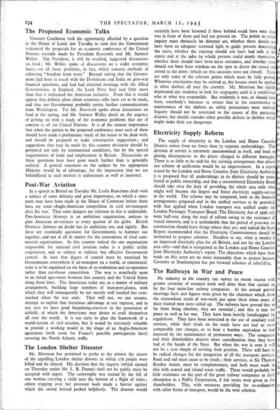The Railways in War and Peace
No industry in the country can survey its recent record with greater certainty of essential work well done than that carried on by the four main-line railway companies. At the annual general meetings facts and figures were given by the chairmen which show the tremendous strain of war-work put upon them when many of their trained men were called up. The railways have proved that so far from being obsolete, they are essential ; and this is true for peace as well as for war. They have been heavily handicapped by regulations. They have been .restricted in the use of auxiliary road services, while their rivals on the roads have not had to meet comparable rate charges, or to bear a burden equivalent to that imposed by the maintenance of, permanent ways. The companies and their shareholders deserve more consideration than they have had at the hands of the State. But when the war is over it will not be a case simply of revising their position. There will have to be radical changes for the integration of all the transport services. Road and rail must cease to be rivals ; their services, as Sir Thomas Royden insists, must be complementary, and both must work in also with coastal and inland water traffic. There would probably be little resistance on the part of the great railway companies to their absorption in a Public Corporation, if fair terms were given to the shareholders. This, with measures providing for co-ordination with other forms of transport, would be the wise solution.


























 Previous page
Previous page